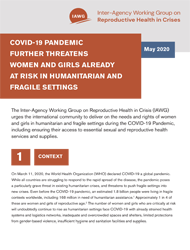 The Inter-Agency Working Group on Reproductive Health in Crisis (IAWG) urges the international community to deliver on the needs and rights of women and girls in humanitarian and fragile settings during the COVID-19 Pandemic, including ensuring their access to essential sexual and reproductive health services and supplies.
The Inter-Agency Working Group on Reproductive Health in Crisis (IAWG) urges the international community to deliver on the needs and rights of women and girls in humanitarian and fragile settings during the COVID-19 Pandemic, including ensuring their access to essential sexual and reproductive health services and supplies.
On March 11, 2020, the World Health Organization (WHO) declared COVID-19 a global pandemic. While all countries are struggling to respond to the rapid spread of the disease, the pandemic poses a particularly grave threat in existing humanitarian crises, and threatens to push fragile settings into new crises. Even before the COVID-19 pandemic, an estimated 1.8 billion people were living in fragile contexts worldwide, including 168 million in need of humanitarian assistance.1 Approximately 1 in 4 of these are women and girls of reproductive age.2 The number of women and girls who are critically at risk will undoubtedly continue to rise as humanitarian settings face COVID-19 with already strained health systems and logistics networks, inadequate and overcrowded spaces and shelters, limited protections from gender-based violence, insufficient hygiene and sanitation facilities and supplies.
Ensuring the provision of comprehensive sexual and reproductive health information, services, and supplies in humanitarian settings is central not only to an effective response but also to fulfilling international legal obligations.
Now is the time for governments, humanitarian actors and the private sector to work together to ensure the availability of, and access to, essential and rights-fulfilling sexual and reproductive health services, including contraception, intrapartum care for all births, emergency obstetric and newborn care, post-abortion care, safe abortion care to the full extent of the law, clinical care for rape survivors, and prevention and treatment for HIV and other sexually-transmitted infections.